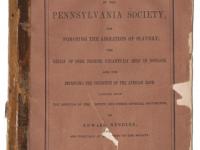The following article is being posted on behalf of Tim Dewysockie, former intern of the archives department. Our thanks go out to him for the work that he completed on this important historical collection. --CH
----------------------------------------------------
My internship in the Archives Department of HSP, which began in January and ends this month, was my first experience working in an archive. I discovered archives while pursuing my MLIS degree at Drexel University, where I became fascinated with how archivists manage aggregates of information. Coming from a library background I was accustomed to working with monographs, so it was a whole new way of understanding how to manage information and seemed very relevant in this digital age brimming with mass quantities of information.
My project at HSP was to improve access to the Pennsylvania Abolition Society (PAS) collection, PAS being the first abolition society in the United States formed in 1775. PAS is still in operation today and works to improve the conditions of African Americans. First, I conducted a shelf read of the 40 linear feet collection to make sure everything was in its right place. Second, I relabeled the boxes of the collection. Third, I arranged and described additions to the collection which spanned from the 1970’s to the 1990’s. Fourth, I recorded information from manumission and indenture records, or records of slaves being freed and indentured into servitude, into a database created for this project. I recorded information such as the names of former slaves, their ages, the length of their indenture, etc. This information will enhance the discoverability of these important documents by making them searchable through indexes. Lastly, I created an inventory of the collection, or a listing of the collection’s contents, in the collection’s new finding aid.
What was most satisfying about this project was working so closely with a single collection. Over the course of five months I grew to not only understand the organization and content of the collection, but also its significance. There are so many important stories in these documents, stories of former slaves being freed and indentured into servitude, the important role PAS played in the early years of the abolition movement, and much, much more. I cannot think of a more exciting first project than making this collection more accessible for researchers, to enable researchers to continue to discover these documents and tell their many vital stories about this chapter of our history.
See the recent blog post linked below to learn more about the Pennsylvania Abolition Society.

